Service Quality: Analyzing EFQM Framework for Squire Hotel Group
VerifiedAdded on 2023/01/16
|21
|4303
|74
Report
AI Summary
This report delves into the European Foundation for Quality Management (EFQM) framework as a critical tool for service management, specifically analyzing its application within the Squire Hotel Group. The report meticulously examines the EFQM's core values, criteria, and radar logic, along with real-world examples of successful implementations in organizations like Intercontinental Hotel Group and Titanic Belfast. The analysis extends to the practical application of EFQM within Squire Hotel Group, including self-assessment, identification of opportunities for improvement, enhancement of service quality, and employee training. Furthermore, the report addresses the limitations of the EFQM model and concludes with recommendations for its future implementation, emphasizing the importance of resources, adoption strategies, and technical considerations for maximizing its effectiveness in organizational service quality management.
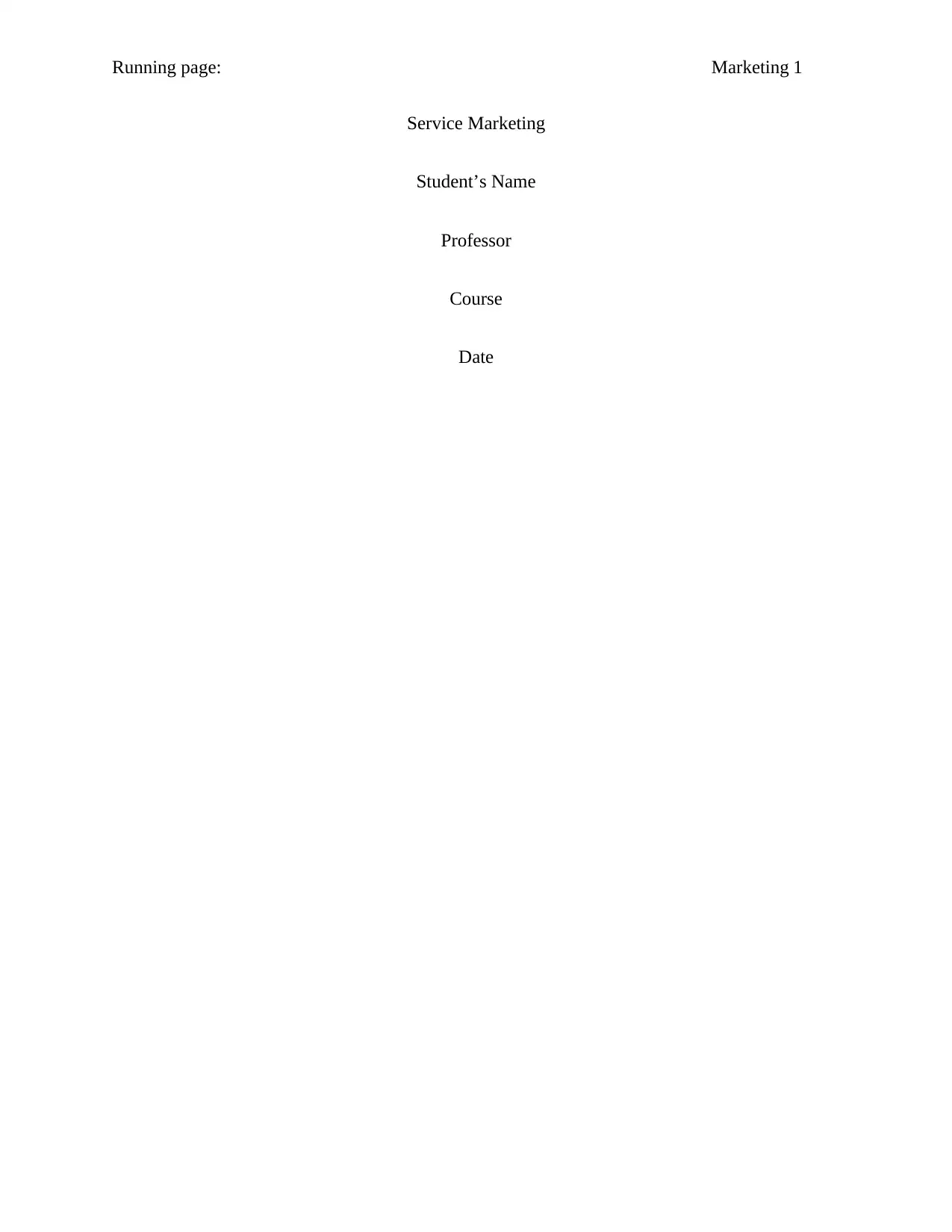
Running page: Marketing 1
Service Marketing
Student’s Name
Professor
Course
Date
Service Marketing
Student’s Name
Professor
Course
Date
Paraphrase This Document
Need a fresh take? Get an instant paraphrase of this document with our AI Paraphraser
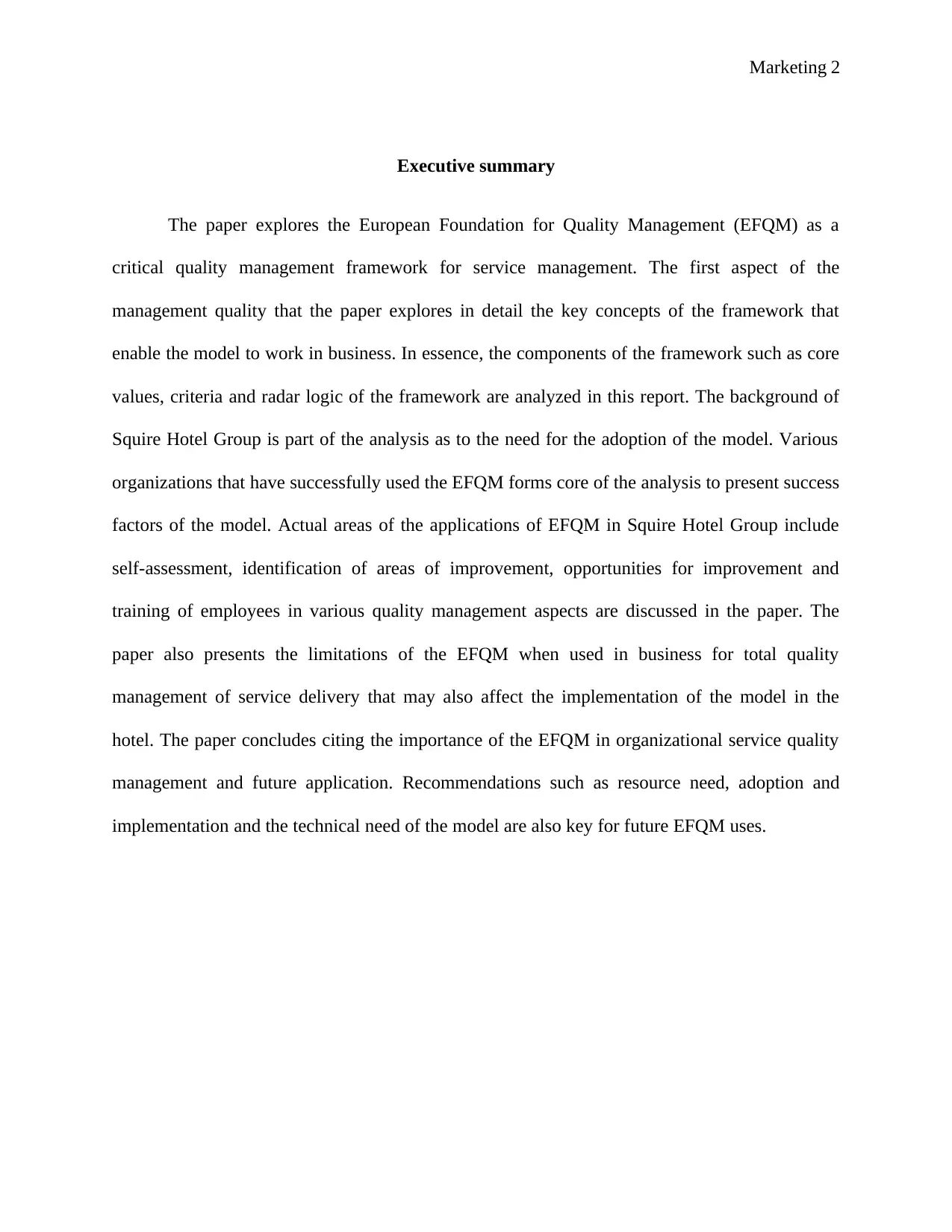
Marketing 2
Executive summary
The paper explores the European Foundation for Quality Management (EFQM) as a
critical quality management framework for service management. The first aspect of the
management quality that the paper explores in detail the key concepts of the framework that
enable the model to work in business. In essence, the components of the framework such as core
values, criteria and radar logic of the framework are analyzed in this report. The background of
Squire Hotel Group is part of the analysis as to the need for the adoption of the model. Various
organizations that have successfully used the EFQM forms core of the analysis to present success
factors of the model. Actual areas of the applications of EFQM in Squire Hotel Group include
self-assessment, identification of areas of improvement, opportunities for improvement and
training of employees in various quality management aspects are discussed in the paper. The
paper also presents the limitations of the EFQM when used in business for total quality
management of service delivery that may also affect the implementation of the model in the
hotel. The paper concludes citing the importance of the EFQM in organizational service quality
management and future application. Recommendations such as resource need, adoption and
implementation and the technical need of the model are also key for future EFQM uses.
Executive summary
The paper explores the European Foundation for Quality Management (EFQM) as a
critical quality management framework for service management. The first aspect of the
management quality that the paper explores in detail the key concepts of the framework that
enable the model to work in business. In essence, the components of the framework such as core
values, criteria and radar logic of the framework are analyzed in this report. The background of
Squire Hotel Group is part of the analysis as to the need for the adoption of the model. Various
organizations that have successfully used the EFQM forms core of the analysis to present success
factors of the model. Actual areas of the applications of EFQM in Squire Hotel Group include
self-assessment, identification of areas of improvement, opportunities for improvement and
training of employees in various quality management aspects are discussed in the paper. The
paper also presents the limitations of the EFQM when used in business for total quality
management of service delivery that may also affect the implementation of the model in the
hotel. The paper concludes citing the importance of the EFQM in organizational service quality
management and future application. Recommendations such as resource need, adoption and
implementation and the technical need of the model are also key for future EFQM uses.
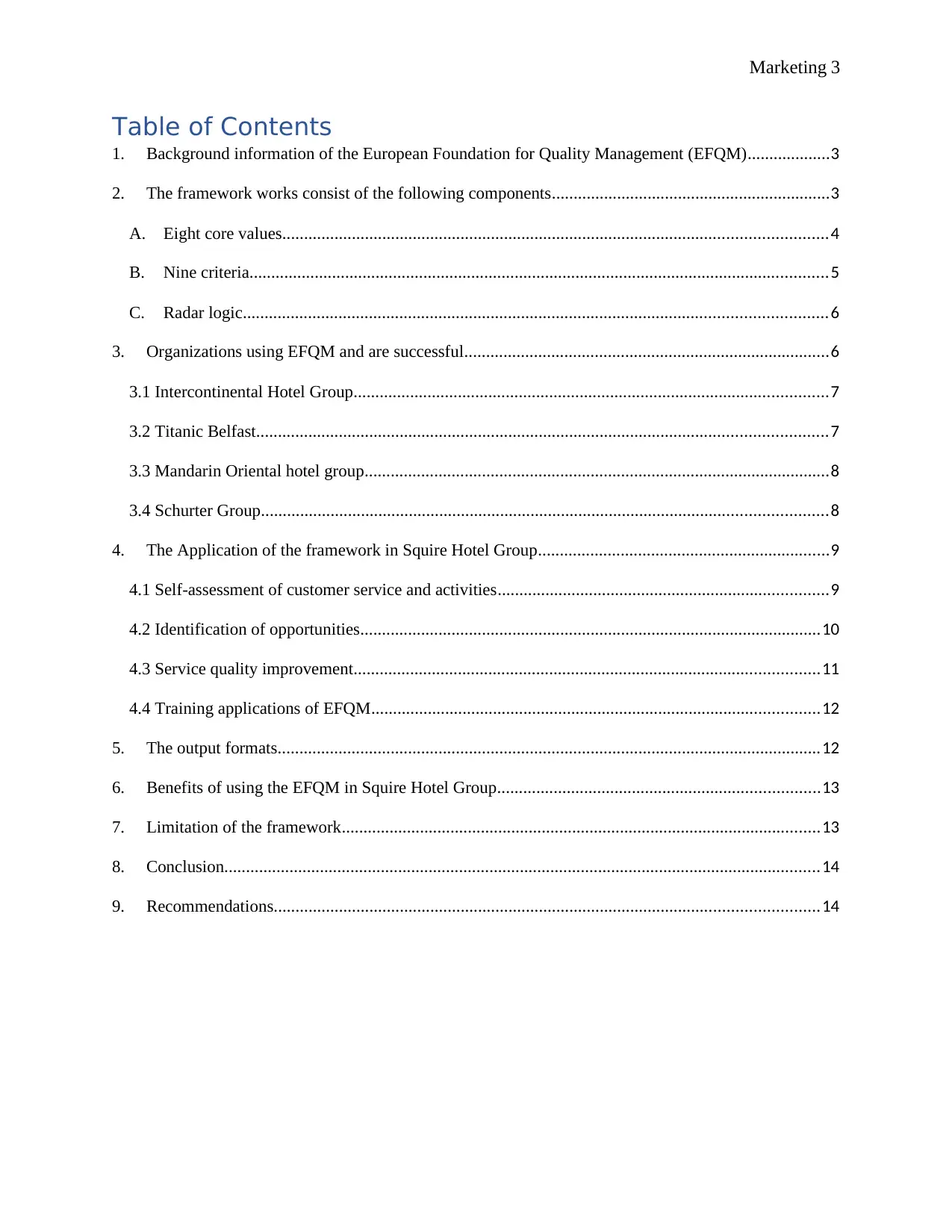
Marketing 3
Table of Contents
1. Background information of the European Foundation for Quality Management (EFQM)...................3
2. The framework works consist of the following components................................................................3
A. Eight core values.............................................................................................................................4
B. Nine criteria.....................................................................................................................................5
C. Radar logic......................................................................................................................................6
3. Organizations using EFQM and are successful....................................................................................6
3.1 Intercontinental Hotel Group.............................................................................................................7
3.2 Titanic Belfast...................................................................................................................................7
3.3 Mandarin Oriental hotel group...........................................................................................................8
3.4 Schurter Group..................................................................................................................................8
4. The Application of the framework in Squire Hotel Group...................................................................9
4.1 Self-assessment of customer service and activities............................................................................9
4.2 Identification of opportunities..........................................................................................................10
4.3 Service quality improvement...........................................................................................................11
4.4 Training applications of EFQM.......................................................................................................12
5. The output formats.............................................................................................................................12
6. Benefits of using the EFQM in Squire Hotel Group..........................................................................13
7. Limitation of the framework..............................................................................................................13
8. Conclusion.........................................................................................................................................14
9. Recommendations.............................................................................................................................14
Table of Contents
1. Background information of the European Foundation for Quality Management (EFQM)...................3
2. The framework works consist of the following components................................................................3
A. Eight core values.............................................................................................................................4
B. Nine criteria.....................................................................................................................................5
C. Radar logic......................................................................................................................................6
3. Organizations using EFQM and are successful....................................................................................6
3.1 Intercontinental Hotel Group.............................................................................................................7
3.2 Titanic Belfast...................................................................................................................................7
3.3 Mandarin Oriental hotel group...........................................................................................................8
3.4 Schurter Group..................................................................................................................................8
4. The Application of the framework in Squire Hotel Group...................................................................9
4.1 Self-assessment of customer service and activities............................................................................9
4.2 Identification of opportunities..........................................................................................................10
4.3 Service quality improvement...........................................................................................................11
4.4 Training applications of EFQM.......................................................................................................12
5. The output formats.............................................................................................................................12
6. Benefits of using the EFQM in Squire Hotel Group..........................................................................13
7. Limitation of the framework..............................................................................................................13
8. Conclusion.........................................................................................................................................14
9. Recommendations.............................................................................................................................14
⊘ This is a preview!⊘
Do you want full access?
Subscribe today to unlock all pages.

Trusted by 1+ million students worldwide
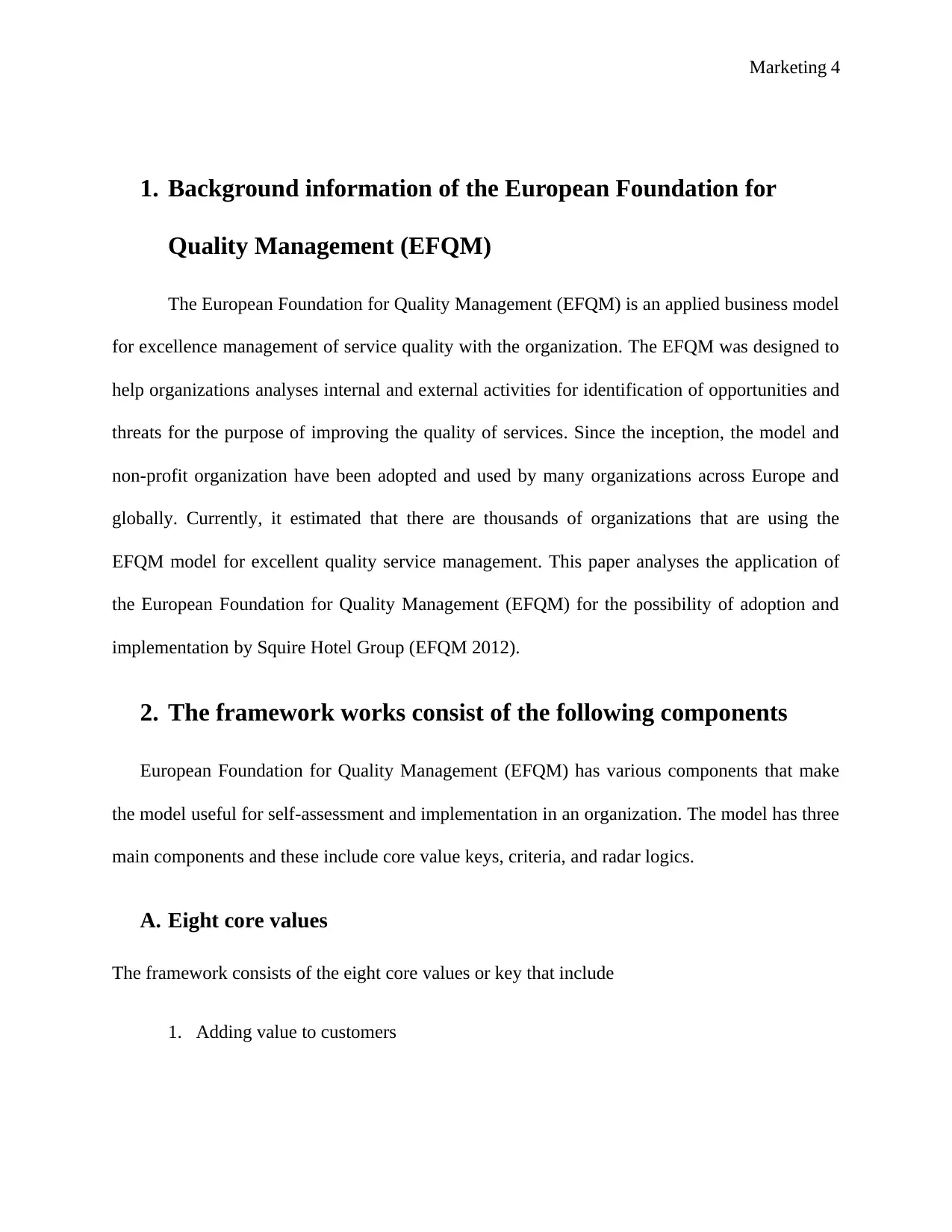
Marketing 4
1. Background information of the European Foundation for
Quality Management (EFQM)
The European Foundation for Quality Management (EFQM) is an applied business model
for excellence management of service quality with the organization. The EFQM was designed to
help organizations analyses internal and external activities for identification of opportunities and
threats for the purpose of improving the quality of services. Since the inception, the model and
non-profit organization have been adopted and used by many organizations across Europe and
globally. Currently, it estimated that there are thousands of organizations that are using the
EFQM model for excellent quality service management. This paper analyses the application of
the European Foundation for Quality Management (EFQM) for the possibility of adoption and
implementation by Squire Hotel Group (EFQM 2012).
2. The framework works consist of the following components
European Foundation for Quality Management (EFQM) has various components that make
the model useful for self-assessment and implementation in an organization. The model has three
main components and these include core value keys, criteria, and radar logics.
A. Eight core values
The framework consists of the eight core values or key that include
1. Adding value to customers
1. Background information of the European Foundation for
Quality Management (EFQM)
The European Foundation for Quality Management (EFQM) is an applied business model
for excellence management of service quality with the organization. The EFQM was designed to
help organizations analyses internal and external activities for identification of opportunities and
threats for the purpose of improving the quality of services. Since the inception, the model and
non-profit organization have been adopted and used by many organizations across Europe and
globally. Currently, it estimated that there are thousands of organizations that are using the
EFQM model for excellent quality service management. This paper analyses the application of
the European Foundation for Quality Management (EFQM) for the possibility of adoption and
implementation by Squire Hotel Group (EFQM 2012).
2. The framework works consist of the following components
European Foundation for Quality Management (EFQM) has various components that make
the model useful for self-assessment and implementation in an organization. The model has three
main components and these include core value keys, criteria, and radar logics.
A. Eight core values
The framework consists of the eight core values or key that include
1. Adding value to customers
Paraphrase This Document
Need a fresh take? Get an instant paraphrase of this document with our AI Paraphraser
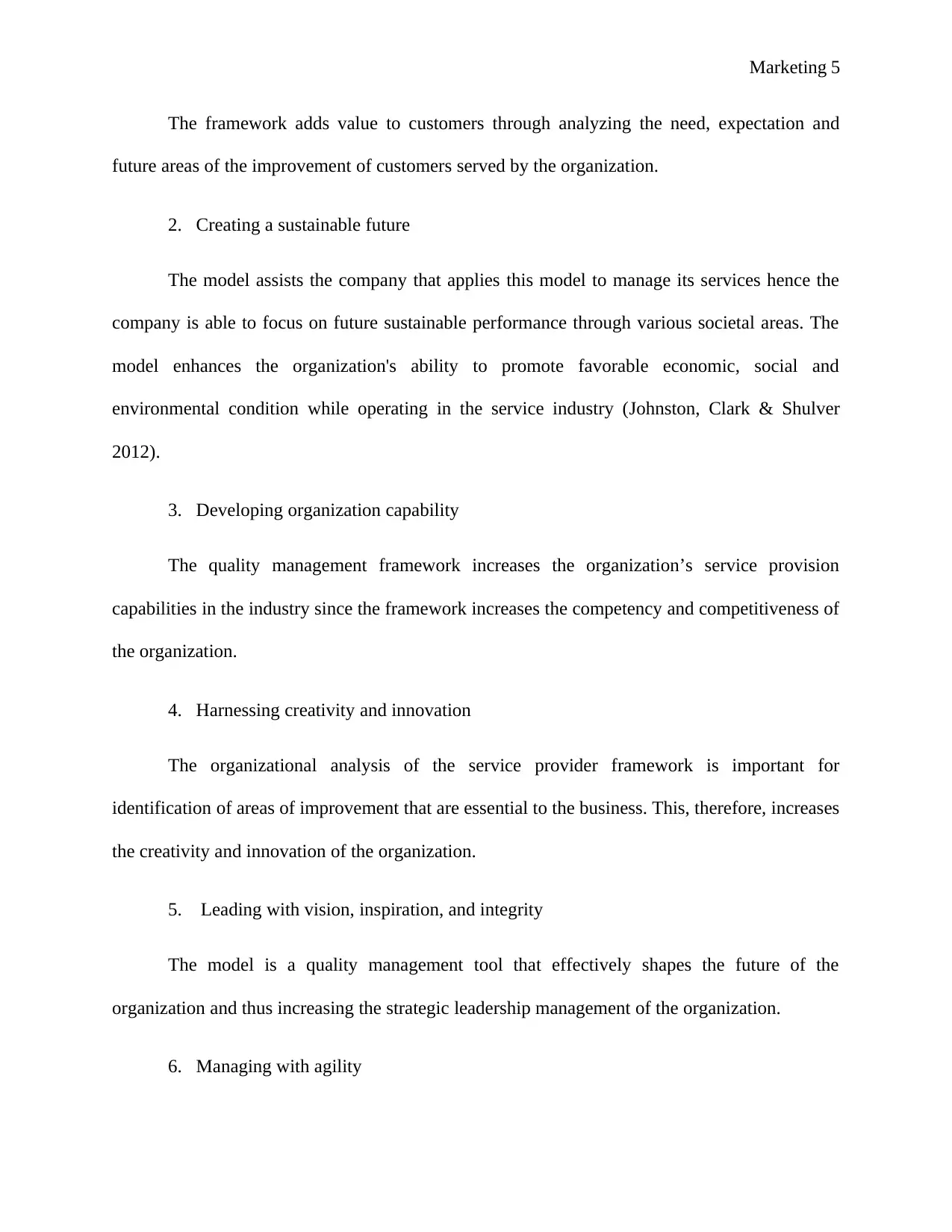
Marketing 5
The framework adds value to customers through analyzing the need, expectation and
future areas of the improvement of customers served by the organization.
2. Creating a sustainable future
The model assists the company that applies this model to manage its services hence the
company is able to focus on future sustainable performance through various societal areas. The
model enhances the organization's ability to promote favorable economic, social and
environmental condition while operating in the service industry (Johnston, Clark & Shulver
2012).
3. Developing organization capability
The quality management framework increases the organization’s service provision
capabilities in the industry since the framework increases the competency and competitiveness of
the organization.
4. Harnessing creativity and innovation
The organizational analysis of the service provider framework is important for
identification of areas of improvement that are essential to the business. This, therefore, increases
the creativity and innovation of the organization.
5. Leading with vision, inspiration, and integrity
The model is a quality management tool that effectively shapes the future of the
organization and thus increasing the strategic leadership management of the organization.
6. Managing with agility
The framework adds value to customers through analyzing the need, expectation and
future areas of the improvement of customers served by the organization.
2. Creating a sustainable future
The model assists the company that applies this model to manage its services hence the
company is able to focus on future sustainable performance through various societal areas. The
model enhances the organization's ability to promote favorable economic, social and
environmental condition while operating in the service industry (Johnston, Clark & Shulver
2012).
3. Developing organization capability
The quality management framework increases the organization’s service provision
capabilities in the industry since the framework increases the competency and competitiveness of
the organization.
4. Harnessing creativity and innovation
The organizational analysis of the service provider framework is important for
identification of areas of improvement that are essential to the business. This, therefore, increases
the creativity and innovation of the organization.
5. Leading with vision, inspiration, and integrity
The model is a quality management tool that effectively shapes the future of the
organization and thus increasing the strategic leadership management of the organization.
6. Managing with agility
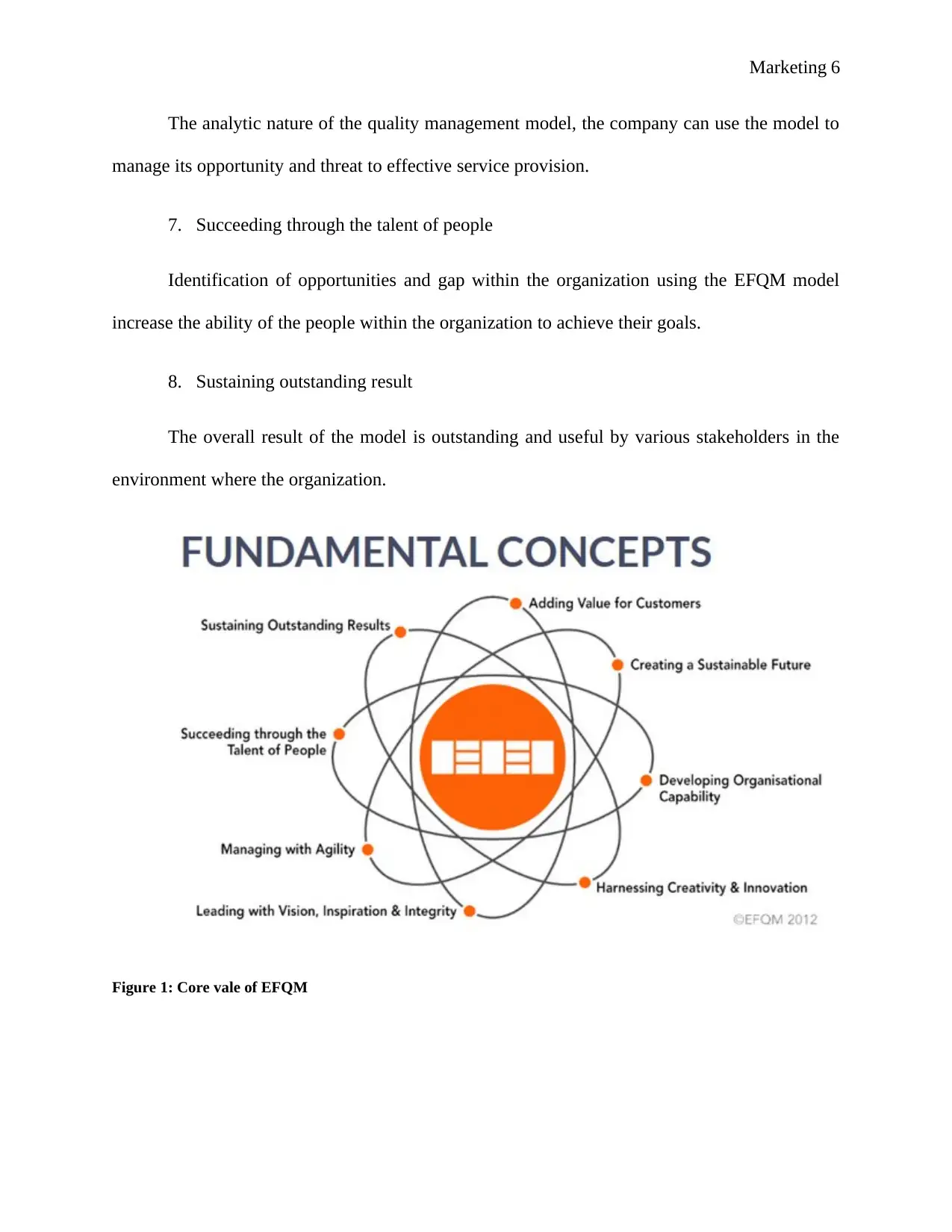
Marketing 6
The analytic nature of the quality management model, the company can use the model to
manage its opportunity and threat to effective service provision.
7. Succeeding through the talent of people
Identification of opportunities and gap within the organization using the EFQM model
increase the ability of the people within the organization to achieve their goals.
8. Sustaining outstanding result
The overall result of the model is outstanding and useful by various stakeholders in the
environment where the organization.
Figure 1: Core vale of EFQM
The analytic nature of the quality management model, the company can use the model to
manage its opportunity and threat to effective service provision.
7. Succeeding through the talent of people
Identification of opportunities and gap within the organization using the EFQM model
increase the ability of the people within the organization to achieve their goals.
8. Sustaining outstanding result
The overall result of the model is outstanding and useful by various stakeholders in the
environment where the organization.
Figure 1: Core vale of EFQM
⊘ This is a preview!⊘
Do you want full access?
Subscribe today to unlock all pages.

Trusted by 1+ million students worldwide
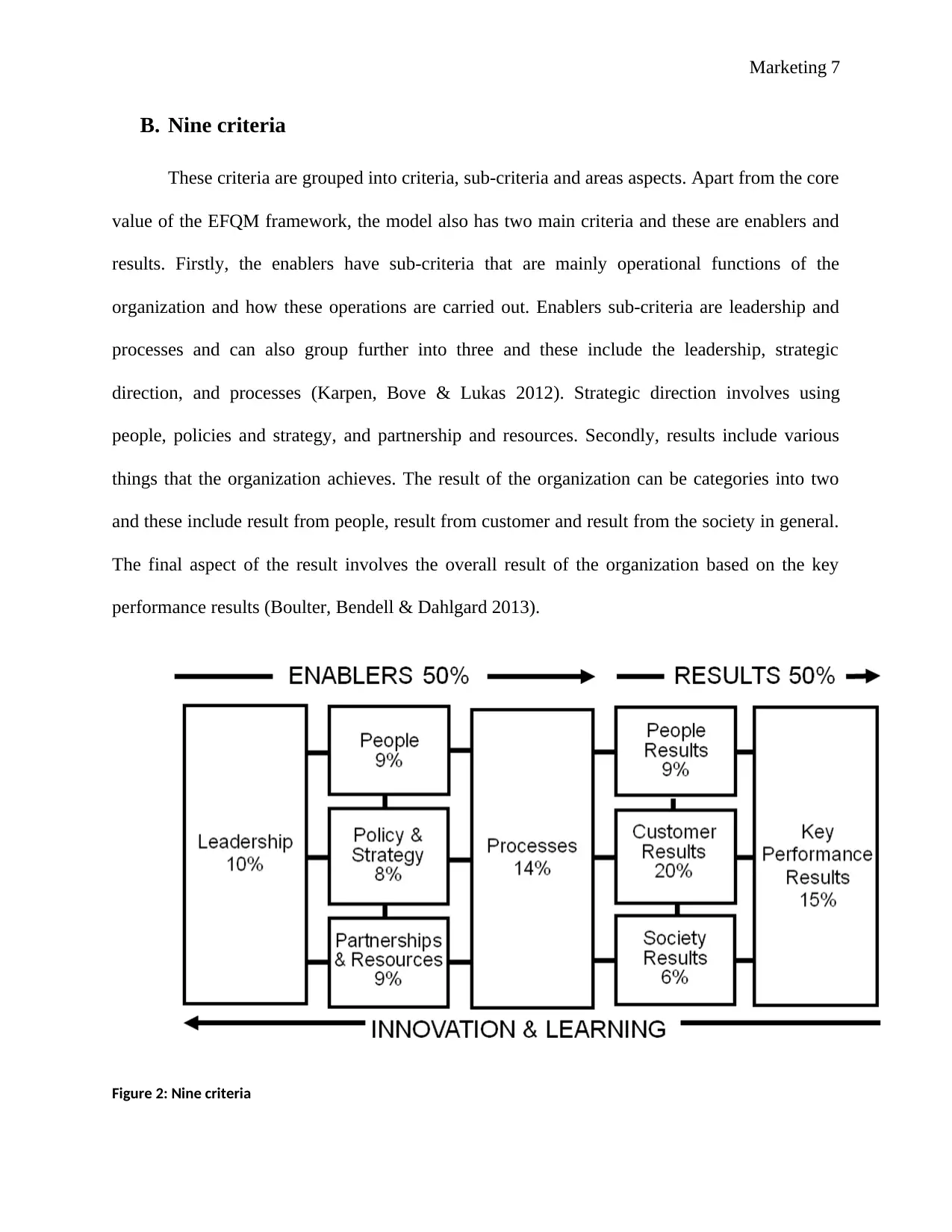
Marketing 7
B. Nine criteria
These criteria are grouped into criteria, sub-criteria and areas aspects. Apart from the core
value of the EFQM framework, the model also has two main criteria and these are enablers and
results. Firstly, the enablers have sub-criteria that are mainly operational functions of the
organization and how these operations are carried out. Enablers sub-criteria are leadership and
processes and can also group further into three and these include the leadership, strategic
direction, and processes (Karpen, Bove & Lukas 2012). Strategic direction involves using
people, policies and strategy, and partnership and resources. Secondly, results include various
things that the organization achieves. The result of the organization can be categories into two
and these include result from people, result from customer and result from the society in general.
The final aspect of the result involves the overall result of the organization based on the key
performance results (Boulter, Bendell & Dahlgard 2013).
Figure 2: Nine criteria
B. Nine criteria
These criteria are grouped into criteria, sub-criteria and areas aspects. Apart from the core
value of the EFQM framework, the model also has two main criteria and these are enablers and
results. Firstly, the enablers have sub-criteria that are mainly operational functions of the
organization and how these operations are carried out. Enablers sub-criteria are leadership and
processes and can also group further into three and these include the leadership, strategic
direction, and processes (Karpen, Bove & Lukas 2012). Strategic direction involves using
people, policies and strategy, and partnership and resources. Secondly, results include various
things that the organization achieves. The result of the organization can be categories into two
and these include result from people, result from customer and result from the society in general.
The final aspect of the result involves the overall result of the organization based on the key
performance results (Boulter, Bendell & Dahlgard 2013).
Figure 2: Nine criteria
Paraphrase This Document
Need a fresh take? Get an instant paraphrase of this document with our AI Paraphraser
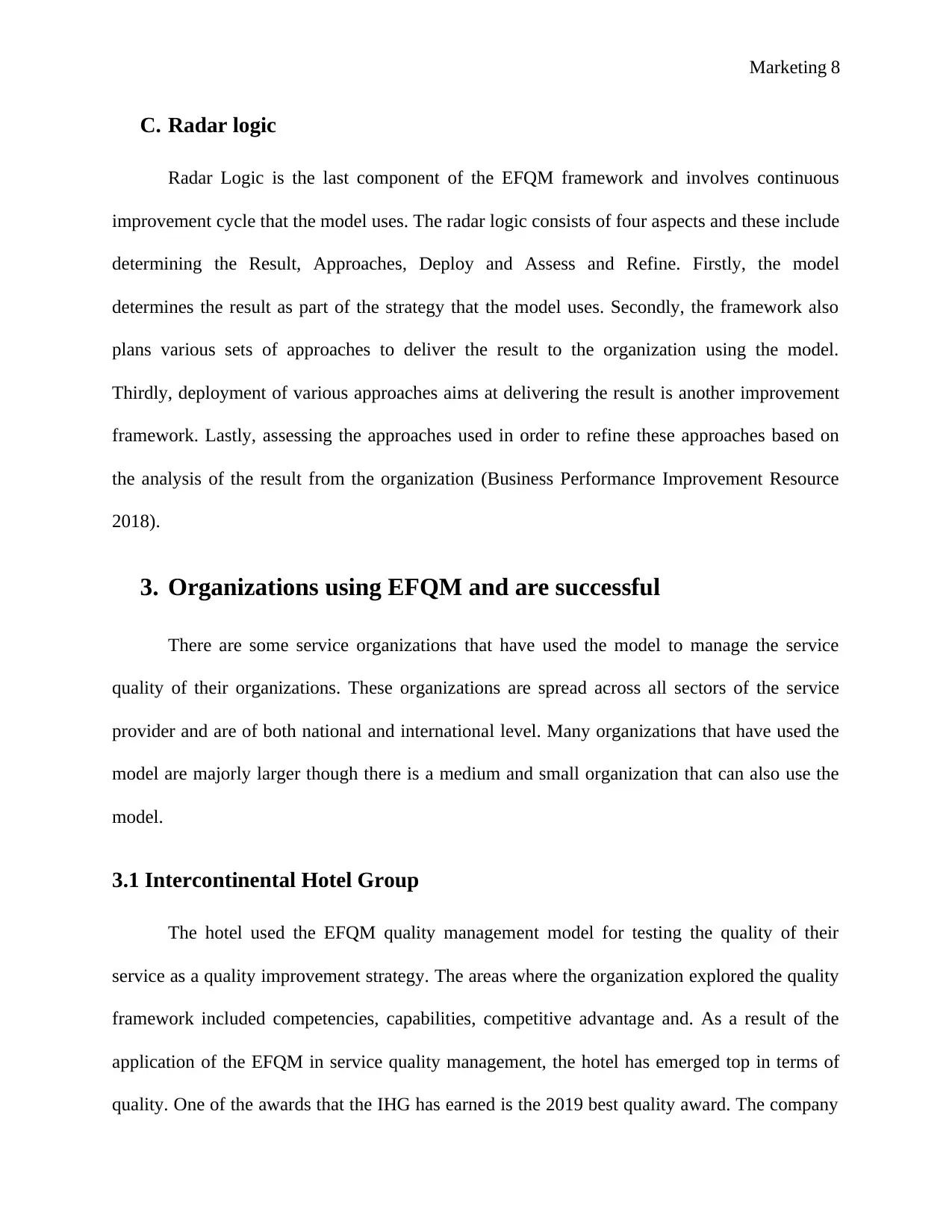
Marketing 8
C. Radar logic
Radar Logic is the last component of the EFQM framework and involves continuous
improvement cycle that the model uses. The radar logic consists of four aspects and these include
determining the Result, Approaches, Deploy and Assess and Refine. Firstly, the model
determines the result as part of the strategy that the model uses. Secondly, the framework also
plans various sets of approaches to deliver the result to the organization using the model.
Thirdly, deployment of various approaches aims at delivering the result is another improvement
framework. Lastly, assessing the approaches used in order to refine these approaches based on
the analysis of the result from the organization (Business Performance Improvement Resource
2018).
3. Organizations using EFQM and are successful
There are some service organizations that have used the model to manage the service
quality of their organizations. These organizations are spread across all sectors of the service
provider and are of both national and international level. Many organizations that have used the
model are majorly larger though there is a medium and small organization that can also use the
model.
3.1 Intercontinental Hotel Group
The hotel used the EFQM quality management model for testing the quality of their
service as a quality improvement strategy. The areas where the organization explored the quality
framework included competencies, capabilities, competitive advantage and. As a result of the
application of the EFQM in service quality management, the hotel has emerged top in terms of
quality. One of the awards that the IHG has earned is the 2019 best quality award. The company
C. Radar logic
Radar Logic is the last component of the EFQM framework and involves continuous
improvement cycle that the model uses. The radar logic consists of four aspects and these include
determining the Result, Approaches, Deploy and Assess and Refine. Firstly, the model
determines the result as part of the strategy that the model uses. Secondly, the framework also
plans various sets of approaches to deliver the result to the organization using the model.
Thirdly, deployment of various approaches aims at delivering the result is another improvement
framework. Lastly, assessing the approaches used in order to refine these approaches based on
the analysis of the result from the organization (Business Performance Improvement Resource
2018).
3. Organizations using EFQM and are successful
There are some service organizations that have used the model to manage the service
quality of their organizations. These organizations are spread across all sectors of the service
provider and are of both national and international level. Many organizations that have used the
model are majorly larger though there is a medium and small organization that can also use the
model.
3.1 Intercontinental Hotel Group
The hotel used the EFQM quality management model for testing the quality of their
service as a quality improvement strategy. The areas where the organization explored the quality
framework included competencies, capabilities, competitive advantage and. As a result of the
application of the EFQM in service quality management, the hotel has emerged top in terms of
quality. One of the awards that the IHG has earned is the 2019 best quality award. The company
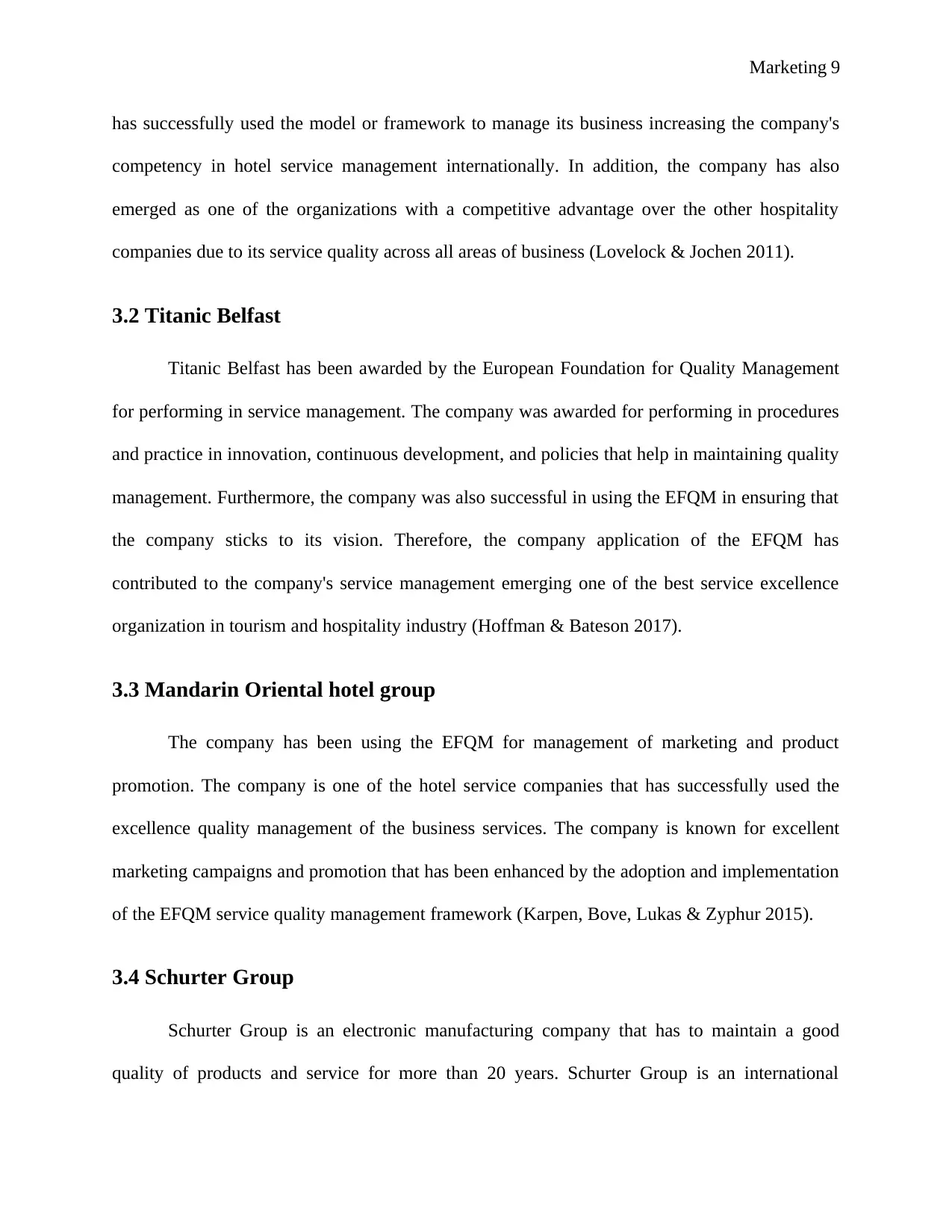
Marketing 9
has successfully used the model or framework to manage its business increasing the company's
competency in hotel service management internationally. In addition, the company has also
emerged as one of the organizations with a competitive advantage over the other hospitality
companies due to its service quality across all areas of business (Lovelock & Jochen 2011).
3.2 Titanic Belfast
Titanic Belfast has been awarded by the European Foundation for Quality Management
for performing in service management. The company was awarded for performing in procedures
and practice in innovation, continuous development, and policies that help in maintaining quality
management. Furthermore, the company was also successful in using the EFQM in ensuring that
the company sticks to its vision. Therefore, the company application of the EFQM has
contributed to the company's service management emerging one of the best service excellence
organization in tourism and hospitality industry (Hoffman & Bateson 2017).
3.3 Mandarin Oriental hotel group
The company has been using the EFQM for management of marketing and product
promotion. The company is one of the hotel service companies that has successfully used the
excellence quality management of the business services. The company is known for excellent
marketing campaigns and promotion that has been enhanced by the adoption and implementation
of the EFQM service quality management framework (Karpen, Bove, Lukas & Zyphur 2015).
3.4 Schurter Group
Schurter Group is an electronic manufacturing company that has to maintain a good
quality of products and service for more than 20 years. Schurter Group is an international
has successfully used the model or framework to manage its business increasing the company's
competency in hotel service management internationally. In addition, the company has also
emerged as one of the organizations with a competitive advantage over the other hospitality
companies due to its service quality across all areas of business (Lovelock & Jochen 2011).
3.2 Titanic Belfast
Titanic Belfast has been awarded by the European Foundation for Quality Management
for performing in service management. The company was awarded for performing in procedures
and practice in innovation, continuous development, and policies that help in maintaining quality
management. Furthermore, the company was also successful in using the EFQM in ensuring that
the company sticks to its vision. Therefore, the company application of the EFQM has
contributed to the company's service management emerging one of the best service excellence
organization in tourism and hospitality industry (Hoffman & Bateson 2017).
3.3 Mandarin Oriental hotel group
The company has been using the EFQM for management of marketing and product
promotion. The company is one of the hotel service companies that has successfully used the
excellence quality management of the business services. The company is known for excellent
marketing campaigns and promotion that has been enhanced by the adoption and implementation
of the EFQM service quality management framework (Karpen, Bove, Lukas & Zyphur 2015).
3.4 Schurter Group
Schurter Group is an electronic manufacturing company that has to maintain a good
quality of products and service for more than 20 years. Schurter Group is an international
⊘ This is a preview!⊘
Do you want full access?
Subscribe today to unlock all pages.

Trusted by 1+ million students worldwide
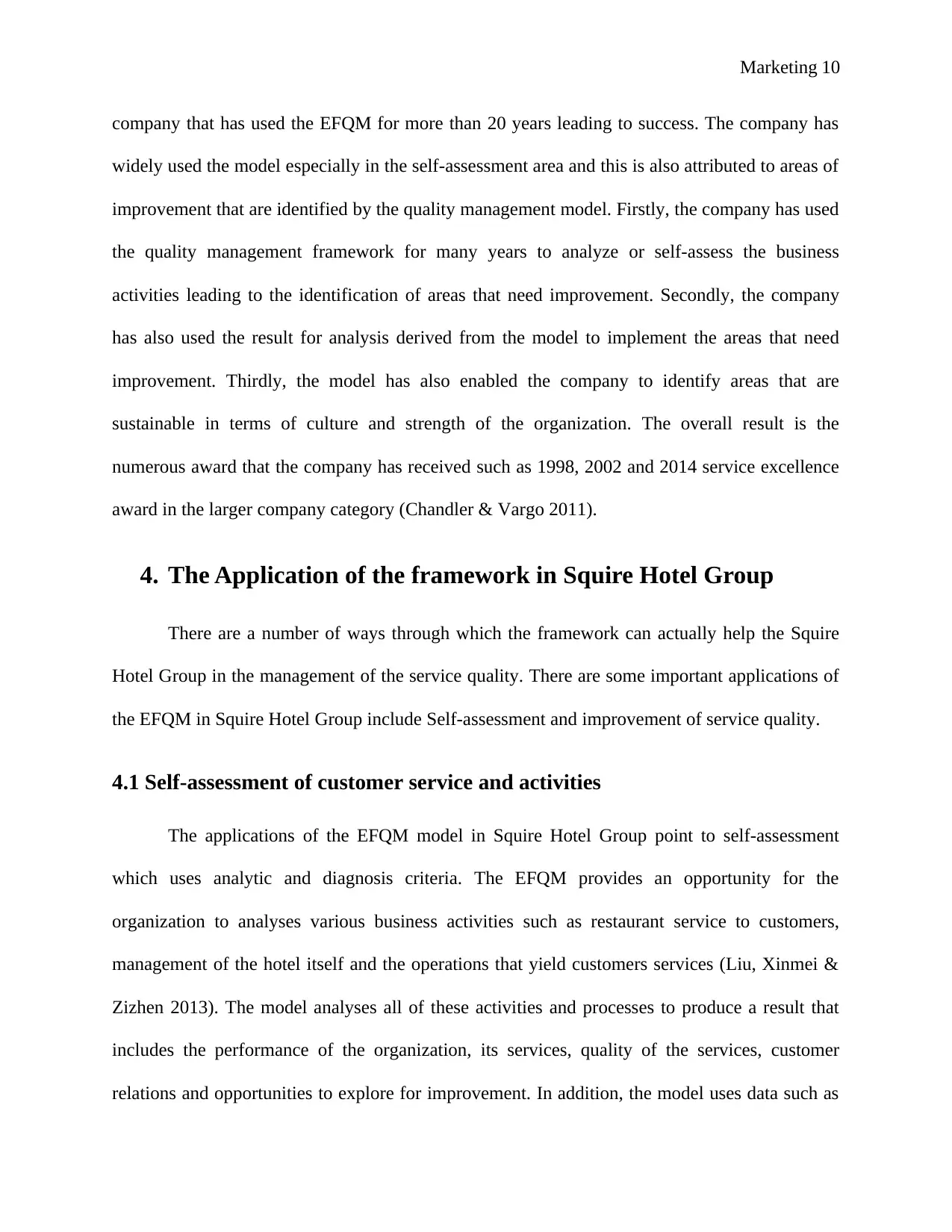
Marketing 10
company that has used the EFQM for more than 20 years leading to success. The company has
widely used the model especially in the self-assessment area and this is also attributed to areas of
improvement that are identified by the quality management model. Firstly, the company has used
the quality management framework for many years to analyze or self-assess the business
activities leading to the identification of areas that need improvement. Secondly, the company
has also used the result for analysis derived from the model to implement the areas that need
improvement. Thirdly, the model has also enabled the company to identify areas that are
sustainable in terms of culture and strength of the organization. The overall result is the
numerous award that the company has received such as 1998, 2002 and 2014 service excellence
award in the larger company category (Chandler & Vargo 2011).
4. The Application of the framework in Squire Hotel Group
There are a number of ways through which the framework can actually help the Squire
Hotel Group in the management of the service quality. There are some important applications of
the EFQM in Squire Hotel Group include Self-assessment and improvement of service quality.
4.1 Self-assessment of customer service and activities
The applications of the EFQM model in Squire Hotel Group point to self-assessment
which uses analytic and diagnosis criteria. The EFQM provides an opportunity for the
organization to analyses various business activities such as restaurant service to customers,
management of the hotel itself and the operations that yield customers services (Liu, Xinmei &
Zizhen 2013). The model analyses all of these activities and processes to produce a result that
includes the performance of the organization, its services, quality of the services, customer
relations and opportunities to explore for improvement. In addition, the model uses data such as
company that has used the EFQM for more than 20 years leading to success. The company has
widely used the model especially in the self-assessment area and this is also attributed to areas of
improvement that are identified by the quality management model. Firstly, the company has used
the quality management framework for many years to analyze or self-assess the business
activities leading to the identification of areas that need improvement. Secondly, the company
has also used the result for analysis derived from the model to implement the areas that need
improvement. Thirdly, the model has also enabled the company to identify areas that are
sustainable in terms of culture and strength of the organization. The overall result is the
numerous award that the company has received such as 1998, 2002 and 2014 service excellence
award in the larger company category (Chandler & Vargo 2011).
4. The Application of the framework in Squire Hotel Group
There are a number of ways through which the framework can actually help the Squire
Hotel Group in the management of the service quality. There are some important applications of
the EFQM in Squire Hotel Group include Self-assessment and improvement of service quality.
4.1 Self-assessment of customer service and activities
The applications of the EFQM model in Squire Hotel Group point to self-assessment
which uses analytic and diagnosis criteria. The EFQM provides an opportunity for the
organization to analyses various business activities such as restaurant service to customers,
management of the hotel itself and the operations that yield customers services (Liu, Xinmei &
Zizhen 2013). The model analyses all of these activities and processes to produce a result that
includes the performance of the organization, its services, quality of the services, customer
relations and opportunities to explore for improvement. In addition, the model uses data such as
Paraphrase This Document
Need a fresh take? Get an instant paraphrase of this document with our AI Paraphraser
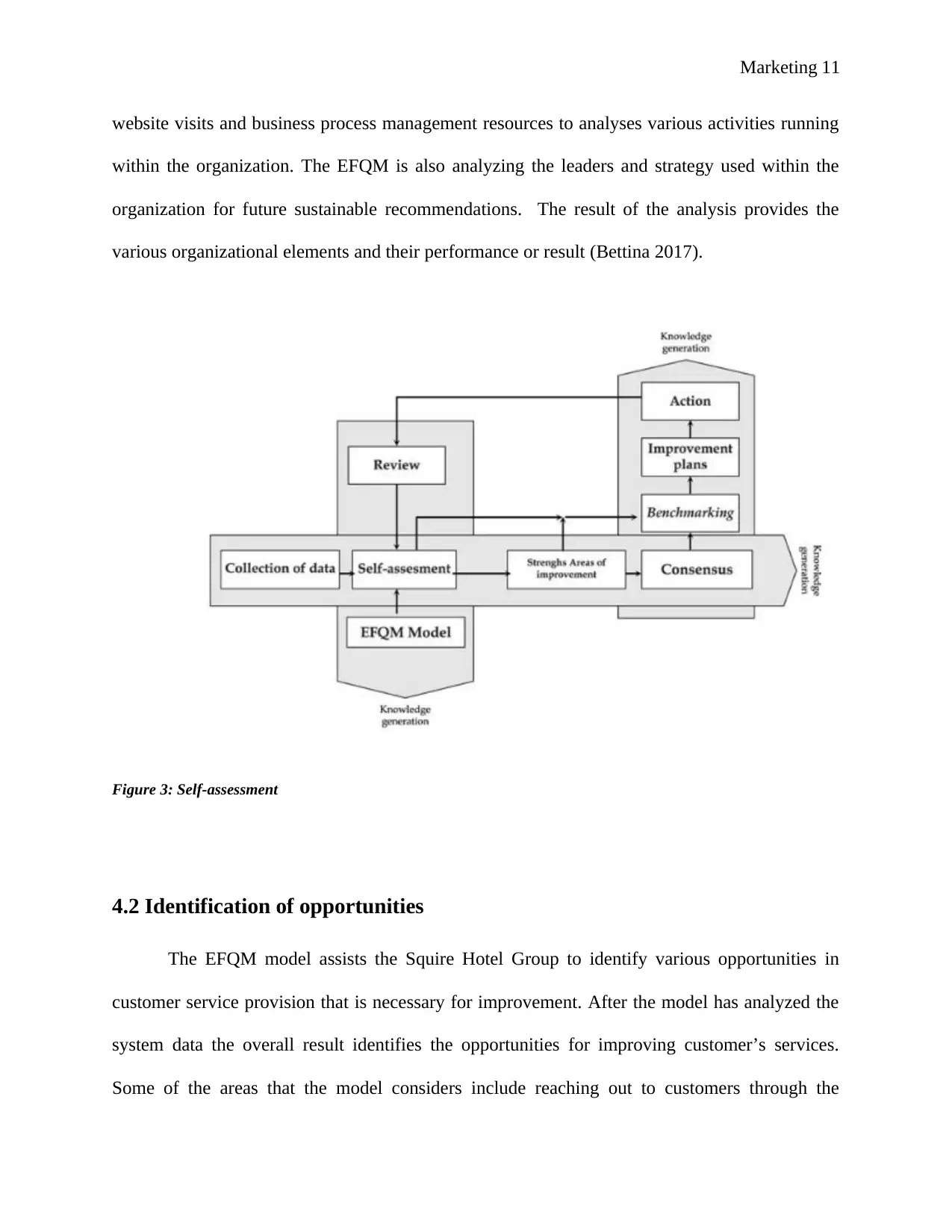
Marketing 11
website visits and business process management resources to analyses various activities running
within the organization. The EFQM is also analyzing the leaders and strategy used within the
organization for future sustainable recommendations. The result of the analysis provides the
various organizational elements and their performance or result (Bettina 2017).
Figure 3: Self-assessment
4.2 Identification of opportunities
The EFQM model assists the Squire Hotel Group to identify various opportunities in
customer service provision that is necessary for improvement. After the model has analyzed the
system data the overall result identifies the opportunities for improving customer’s services.
Some of the areas that the model considers include reaching out to customers through the
website visits and business process management resources to analyses various activities running
within the organization. The EFQM is also analyzing the leaders and strategy used within the
organization for future sustainable recommendations. The result of the analysis provides the
various organizational elements and their performance or result (Bettina 2017).
Figure 3: Self-assessment
4.2 Identification of opportunities
The EFQM model assists the Squire Hotel Group to identify various opportunities in
customer service provision that is necessary for improvement. After the model has analyzed the
system data the overall result identifies the opportunities for improving customer’s services.
Some of the areas that the model considers include reaching out to customers through the
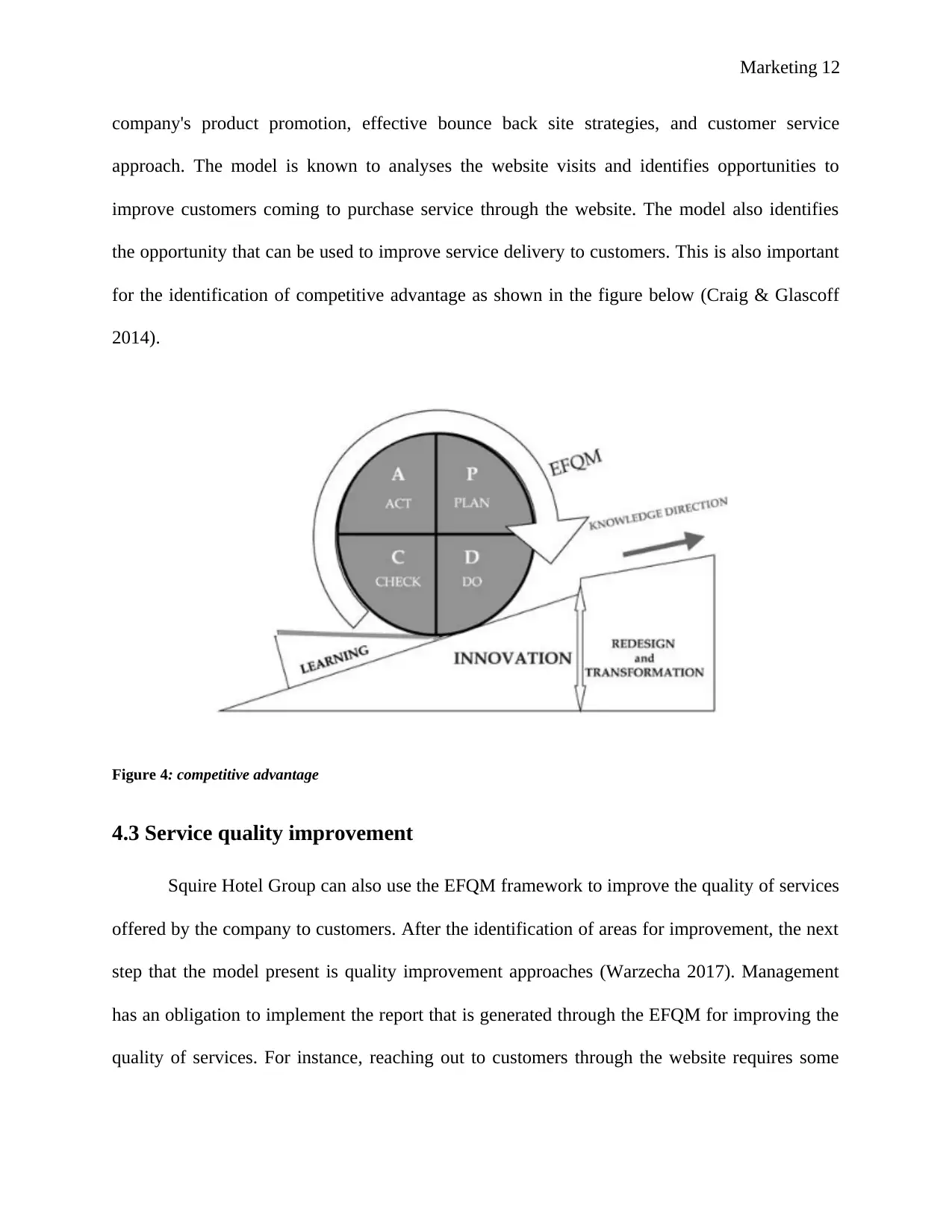
Marketing 12
company's product promotion, effective bounce back site strategies, and customer service
approach. The model is known to analyses the website visits and identifies opportunities to
improve customers coming to purchase service through the website. The model also identifies
the opportunity that can be used to improve service delivery to customers. This is also important
for the identification of competitive advantage as shown in the figure below (Craig & Glascoff
2014).
Figure 4: competitive advantage
4.3 Service quality improvement
Squire Hotel Group can also use the EFQM framework to improve the quality of services
offered by the company to customers. After the identification of areas for improvement, the next
step that the model present is quality improvement approaches (Warzecha 2017). Management
has an obligation to implement the report that is generated through the EFQM for improving the
quality of services. For instance, reaching out to customers through the website requires some
company's product promotion, effective bounce back site strategies, and customer service
approach. The model is known to analyses the website visits and identifies opportunities to
improve customers coming to purchase service through the website. The model also identifies
the opportunity that can be used to improve service delivery to customers. This is also important
for the identification of competitive advantage as shown in the figure below (Craig & Glascoff
2014).
Figure 4: competitive advantage
4.3 Service quality improvement
Squire Hotel Group can also use the EFQM framework to improve the quality of services
offered by the company to customers. After the identification of areas for improvement, the next
step that the model present is quality improvement approaches (Warzecha 2017). Management
has an obligation to implement the report that is generated through the EFQM for improving the
quality of services. For instance, reaching out to customers through the website requires some
⊘ This is a preview!⊘
Do you want full access?
Subscribe today to unlock all pages.

Trusted by 1+ million students worldwide
1 out of 21
Related Documents
Your All-in-One AI-Powered Toolkit for Academic Success.
+13062052269
info@desklib.com
Available 24*7 on WhatsApp / Email
![[object Object]](/_next/static/media/star-bottom.7253800d.svg)
Unlock your academic potential
Copyright © 2020–2026 A2Z Services. All Rights Reserved. Developed and managed by ZUCOL.





